When her Boko Haram captors told Margret Yama she would be going home, she thought it was a trick. She and the other girls kidnapped from their school in Chibok, in north-east Nigeria’s Borno state, had been held for three years and had been taunted before about the possibility of release.
Conditions where they were being held in Sambisa Forest were harsh. Food and water were limited, the work was hard and the surveillance from the Islamist militants was suffocating. But then came the day in May 2017 when the girls were escorted to a Red Cross convoy on the edges of the forest.
Yama watched as a team of negotiators orchestrated their exchange for Boko Haram prisoners. The group’s leaders withdrew back into the forest and the girls were free, driven to Banki, a town on the border between Nigeria and Cameroon, where a military helicopter picked them up.
Yama was one of 82 girls recovered that month after negotiations between the militants and the Nigerian authorities. The government had been under intense pressure to secure the release of all 276 Chibok girls, who were abducted from their state school dormitories in April 2014 in a kidnapping that made headlines globally.

Boko Haram, which emerged as a jihadist movement in north-east Nigeria in 2009, literally means “western education is forbidden.” Fuelled by resentment of corruption, and the marginalised existence and lack of jobs in the north, Islamist insurgencies had killed nearly 350,000 people by 2020 and displaced more than two million others, according to the UN Development Programme.
Ten years on, many of the Chibok abductees, now women, have been freed or escaped, but about 100 are still missing. Those who returned home, some of whom gave birth while in captivity, have often been viewed as Boko Haram collaborators and shunned by their communities.
Sources have told the Guardian there are no negotiations under way for the release of the remaining girls, despite assurances given to parents by the Borno authorities. So why are so many girls believed to be still in captivity and what has been done to help those who were recovered?
The Chibok abduction on the night of 14 April 2014 was not the first time schoolchildren had been targeted by militants – nor has it been the last. Months before, 29 boys were killed at a school in Yobe state. In 2018, Boko Haram kidnapped dozens of girls in Yobe, and in 2020, more than 300 boys were abducted from schools in Katsina state.
But Chibok has become the most notorious example of Nigeria’s security crisis. That so many children could be taken from one school sparked outrage in Nigeria and abroad.
A group of Nigerian women launched the social-media campaign #BringBackOurGirls, which became a powerful global protest attracting the support of the then US first lady, Michelle Obama, and the Nobel peace laureate Malala Yousafzai.
The then president of Nigeria, Goodluck Jonathan, received immediate offers of help from the US, Britain, France and China.
Matthew Page, an analyst with the British foreign affairs thinktank Chatham House, who worked for US intelligence at the time, says: “[The kidnapping] was so egregious that basically President Obama and his top officials said we need to … pull out all the stops to bring back the girls.
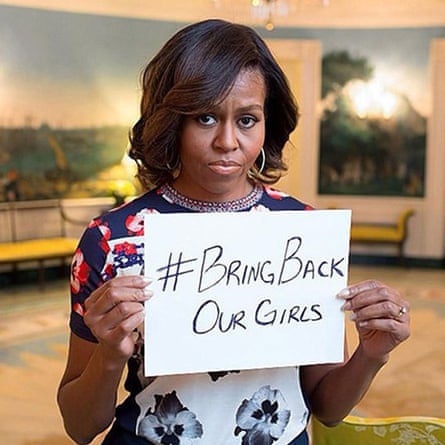
“There was a sense that if we don’t draw a line here – if we don’t go after Boko Haram or try to rescue these girls – what are they going to do next?”
But the search for the Chibok girls only began a month after the abductions, as social-media protests snowballed. A video in which the then Boko Haram leader, Abubakar Shekau, threatened to sell the girls at a market escalated the international outrage.
The US, UK, France and China offered Nigeria military and intelligence support. Drones and spy planes scanned the vast Sambisa Forest, but with limited success.
However, there were underlying tensions between Nigeria and the US over human rights violations in counter-terrorism operations in the north, including the March 2014 extrajudicial executions of civilians in the Giwa barracks in Maiduguri. Analysts believed these operations were radicalising young men and pushing them into Boko Haram’s ranks.
US state department officers recall debating whether to share critical intelligence with their Nigerian counterparts, and Nigerian government officials “bristling” at what was seen as US “condescension” and overreach. In the early months of the crisis, Jonathan’s administration rejected a rescue offer by British forces, which had located the girls.

“They resented and rebuffed the outside interference in what they viewed as their own internal security affairs,” says Page. “And they had always been very sceptical of the reasons why the US [and] the British would want to assist them militarily.”
Negotiators who spoke to the Guardian say other concerns also shaped decisions on the viability of any military raid, including fears that the girls might be killed in the crossfire or that there might be suicide bombers.
Amid the inertia, internationally supported rescue plans lost momentum and interest waned.
A looming election in the year after Chibok finally prompted Jonathan to act. He authorised a small mediation team, run by Pascal Holliger, a negotiator with the Swiss foreign ministry, and a Nigerian lawyer, Zanna Mustapha, to negotiate with Boko Haram. Previous talks, including those facilitated by an investigative journalist, Ahmad Salkida, had collapsed.
Mustapha ran an organisation in Borno that helped reintegrate widows and children of Boko Haram members into society. He had represented the late founder of Boko Haram, Mohammed Yusuf, and had built goodwill among the militants.
The negotiations led first to the release of 21 girls, and a few months later another 82.
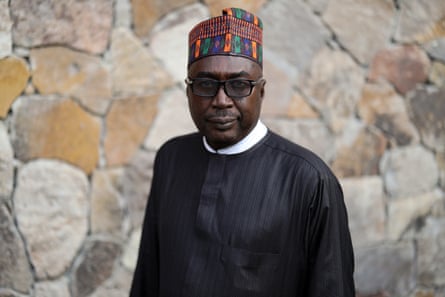
But negotiators say that after these two successes, the government became complacent and put little effort into further negotiations.
“We knew too that dozens and dozens [of girls] had converted and had been married off, and therefore, they were kind of irrecuperable,” says Holliger.
“Our understanding was that after they were married off, they left and went wherever their ‘husband’ went – so they were no longer part of the Chibok group per se. It was never very clear exactly how many were then remaining after that 103 had been freed.”
#BringBackOurGirls’ founders say the remaining abductees have been forgotten, as attention has shifted to more recent attacks and kidnappings in the west African country and amid fears that the girls would have become radicalised while in captivity.
When Yama returned home, she was devastated to learn that her mother had died. “I kept thinking I wouldn’t see her again,” she says. Her mother always waved her off to school but on the day of the abduction, she had seemed reluctant to let her daughter go.
Yama, who prefers not to give her age, remembers the events of April 2014 all too clearly. The militants stormed the school, pretending to be army officers. They set fire to the building and neighbouring homes and bundled the girls on to trucks. Some of the pupils escaped by jumping off the vehicles.

“I thought they just wanted to scare us so we don’t return to school again,” says Yama, because Boko Haram views western education as unIslamic.
During her captivity, Yama resisted the pressure to “marry” a Boko Haram soldier, even though it would have meant no hard labour and better food.
“Why would I marry the one who separated me from my school, my parents and my family? How could I look him in the eyes and call him my husband? I’d rather [have died] of hunger than marry them.”
The girls were ordered to convert to Islam. Yama, who is Christian, pretended to comply, but kept her Bible hidden.
She was warmly welcomed home by her family, after receiving months of counselling in the capital, Abuja. But she has been plagued by “heartbreaking” suspicion and stigma since her release. Rumours have continued to circulate among her community, including that the girls were raped and have children abandoned in the forest.
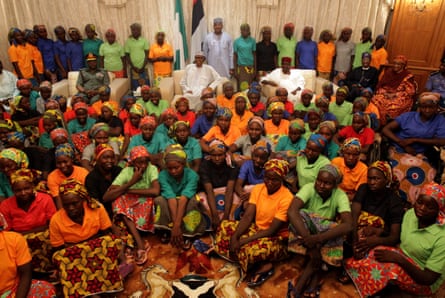
“It’s not me who took myself [into captivity],” she says. “I was forced, so why do they [see] me as Boko Haram?”
She is now studying media at a university in a different state, on a government scholarship. “In school you have to hide what happened to you or else people will keep away from you, thinking that you have that killing mentality,” says Yama.
Although the Nigerian public rallied around calls for the girls’ rescue in the early years, interest gradually waned. Conspiracy theories flourished, such as claims that the girls’ disappearance had been a hoax, fabricated for political ends.
In parts of the north-east, where Boko Haram had a foothold and insecurity remains high, there was resentment over the publicity afforded the Chibok girls. They were perceived as being “darling abductees” – favoured over the more than 1,500 other children snatched or killed by Boko Haram and other Islamist militants.
after newsletter promotion
Muhammadu Buhari, who succeeded Jonathan in 2015 with a campaign to end Nigeria’s insecurity, made some initial progress.
Girls were released, but trust between the government and the militants became strained, and the involvement of too many other actors, in Nigeria and abroad, added to tensions.

Years later, families say they have been told negotiations for the remaining girls are still going on, but activists remain sceptical, and negotiators say talks have ended. The authorities did not respond to the Guardian’s requests for comment.
Meanwhile, those who were recovered still face suspicion and stigma.
Amina Ali Nkeki was found at the edge of the Sambisa Forest by a civilian force after escaping from the militants’ camp in 2016. She was the first Chibok girl to return home.
She had married Mohammed Hayyatu, who claimed he had been forced to join Boko Haram months before the Chibok abductions, and they had a child. She was one of the few married girls to make it home.
Ali did not want to get married but feared sexual slavery more. “The picture I got was that I would be used by a man old enough to be my father, and that when he gets tired of me, he’d hand me over to someone else again,” she says.
“That’s how my life would continue and I would give birth to many children that I’d need to leave with different people, so I just chose to get married to one man.”

Ali had planned to escape but postponed her attempt when Boko Haram threatened to cut the hands off two girls who had tried to run away. Then, as the government stepped up its raids into the forest, she saw her chance and escaped with Hayyatu’s help.
Ali, who is no longer with Hayyatu, is also now at university. Her family has embraced her and her eight-year-old daughter, Safiya, but the girl is often bullied for being a “Boko Haram child”.
While Ali wants to forget the past, she also feels compelled to speak about her experiences. Her best friend, whose photo she keeps close, is still in captivity. “I think about her every day,” she says. “We want our sisters back.”
Aisha Yesufu, co-founder of #BringBackOurGirls, is critical of efforts to rescue the remaining girls. In recent years, those who have returned have either escaped or were found by civilian patrols or during military operations as the government fights for control of north-east Nigeria from jihadist insurgents.
“It has taken this long because they are the children of the poor and, if you are poor in Nigeria, you are faceless, nameless and voiceless,” she says.
Yesufu says she cannot forget Hosea Tsambido, the late leader of the Chibok community who, in April 2014, knelt in the rain at the Unity Fountain in Abuja, during the first major protest about the kidnappings and begged people never to give up.
“Had anyone told me we would still be [demanding their return] almost a decade later, I would have walked away from the Unity Fountain that very day, and I would have never gone back,” says Yesufu.
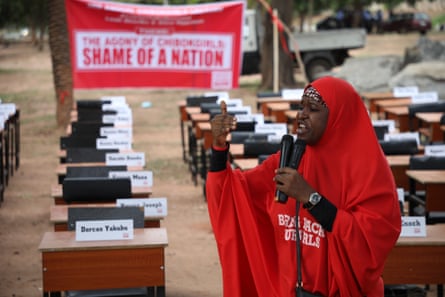
She says the government tried to suppress the campaign in the early days and then sidelined the group as girls returned. She adds that the parents endured so much, with some dying heartbroken.
“Even if they tell us some [girls] have died, can we know where they died, where they are buried? Let’s do something and have closure for the families.”
Over the past decade, Boko Haram’s dominance has faded, triggered by factionalism and the emergence of other militant Islamist groups, but its methods are still followed.
Schools continue to be targeted, particularly in remote areas of the north where security is lax and kidnappers can escape into vast forests. More than 1,500 schoolchildren have been abducted since 2014, most recently last month when gunmen kidnapped at least 287 pupils, aged between seven and 18, from a school in Kuriga, in north-west Nigeria’s Kaduna state.
The kidnappers demanded 1bn naira (£640,000) for their release, but before the deadline about half of the pupils were rescued by the army. Nigeria outlawed ransom payments in 2022.
“It’s a method that started with Boko Haram and has been perfected across the board by armed groups,” says Oluwole Ojewale, of the Institute for Security Studies in Dakar, Senegal.
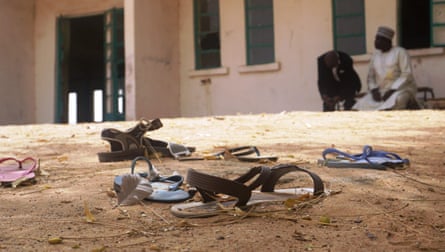
“They [armed groups] gained notoriety as a result of the Chibok girls, and now have a persistent inclination to be in the spotlight and to paint the state as incapable of protecting the people, and that also draws attention to them from potential recruitment pools.”
The Nigerian president, Bola Tinubu, has vowed to prevent schools from becoming “lairs for wanton abductions”, without specifying how.
For those who lost their daughters on that night in April 2014, the search will never end. Lawan Zanna, 55, a civil servant, was at home with his family when he discovered his daughter, Aisha Lawan, was among the girls kidnapped in Chibok.
A simple, idyllic life became a decade-long search for answers that began when he jumped on his motorcycle and headed for the school, a few miles away, to find out what had happened. He found the girls’ secondary school, usually alive with the sounds of hundreds of pupils, deserted.
Zanna, a father of 16, formed a search party with the families of the other kidnapped girls, venturing into the woods armed with makeshift weapons. Two days of frantic searching were unsuccessful.
“If you know what trauma is, then that is what happened to me. Ever since the incident, I hardly eat,” says Zanna, who turned to religion for solace. “I had become so [unhinged] but with the help of our religious leader, who usually comes to talk to me, I was able to build resilience but it has taken many years to get to this place.”
Zanna now leads the Abducted Chibok Girls Parents’ Movement for Rescue, which continues to press for the abductees’ release. Many parents still live in Chibok and have had no news about their daughters since they were taken.
Ladi Yakubu, 50, is another parent whose daughter, Dorcas, was kidnapped. The Chibok local government worker had a heart attack when she heard the news and her health has not recovered.
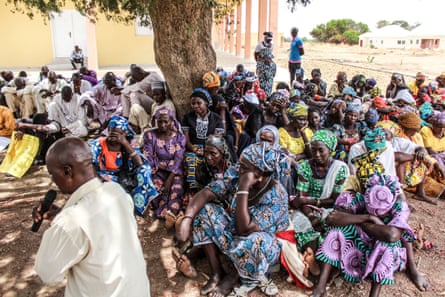
“They took away my daughter in front of my eyes,” she says. “The government could not even rescue her, let alone me. What can I do?
“Any slight thing that scares me, my heart races and I have to be on medication. It has not come so easy for us.”
But despite the uncertainty over efforts at negotiation, the parents continue to hope. “I know my daughter will be back,” says Yakubu. “If God is the one ruling heaven, she will be back.”
